Hi Quartz readers,
If there’s one trend Americans can’t get enough of these days, it’s Crocs. Also: quitting their jobs. More than 15 million US workers have peaced out since April 2021, and the quits rate (the number of people quitting as a percentage of total employment) is hovering around the highest level in at least a decade.
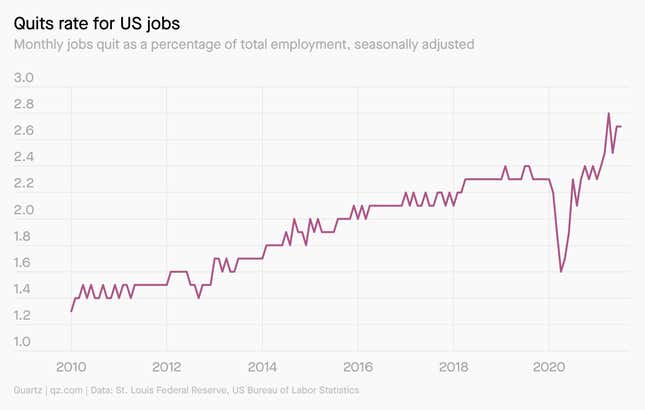
One enduring legacy of the Great Resignation may be the way it’s popularizing “career skepticism”—a term coined by Charlie Warzel, coauthor of a forthcoming book about remote work. Career skeptics understand that most people have to work, but object to the idea that their jobs should play a central role in their identities. As Warzel writes in his newsletter: “What’s profound about the career rejectionists is that their guiding questions are simple. What would life be like if we didn’t live to work?”
Many of those quitting seem to be acting on this idea; they’re seeking out work that fits into their lives, not the other way around. Looking for a job with more flexibility tops the list of reasons Americans cite for seeking a new role in one recent Bankrate survey, while burnout emerged as the most common reason for job-hunting in a June survey from Monster.com. “There have been a lot of epiphanies and reckonings that have occurred during the time with respect to how we’re prioritizing ultimately our values, and of course how work fits into that,” Bankrate’s senior economic analyst told CNBC.
To be sure, some people will continue to prioritize their careers. But the Great Resignation may turn out to be a cultural turning point not unlike Occupy Wall Street, the post-financial-crisis grassroots movement that ultimately raised the prominence of income inequality in the popular consciousness.
Already, career skepticism is proving to be a global phenomenon. In China, the lying-flat movement is taking off as a form of rebellion against constant industriousness. And members of Gen Z, who are entering the workforce as companies struggle to create remote-work culture, may find the prospect of putting their employers’ needs ahead of their own altogether baffling. The pandemic has given lots of people a taste of what it’s like to treat your job as just a job—and it turns out, they like it. —Sarah Todd
✦ This week’s Forecast email is all about what comes after the Great Resignation. It’s where you’ll learn how automation really works, and which office perk’s absence would cause 71% of Gen Z-ers to consider quitting. Check it out by trying membership today—take 40% off with the code QZEMAIL40.
A fitter pill
“Oral antivirals have the potential to not only curtail the duration of one’s Covid-19 syndrome, but also have the potential to limit transmission to people in your household if you are sick.” —Timothy Sheahan, a virologist at the University of North Carolina
The world’s next chance to thwart Covid might be a short-term regimen of daily pills that could fight the virus early after diagnosis. At least three promising antivirals, including one from Merck and another from Pfizer, are being tested in clinical trials, with results expected this year.
Antivirals are already essential treatments for other viral infections, including hepatitis C and HIV. One of the best known is Tamiflu, the widely prescribed pill that can shorten the duration of influenza and reduce the risk of hospitalization if given quickly.
Talking points
💉 Where can you travel with mixed vaccines? Some countries haven’t clarified if passengers who took two different shots are considered “fully vaccinated.”
📉 Nigerian businesses lost 20% of their staff. During the pandemic, more than 70% of businesses in Nigeria also reported revenue losses.
🚴♂️ NYC delivery workers will get a minimum wage. The city council will study working conditions to decide on a “minimum per trip payment.”
👟 Finding Nikes may get harder. Ahead of the holiday shopping season, the company is experiencing supply chain disruptions and shipping delays.
🚚 The UK food industry is importing workers. To alleviate post-Brexit labor pressure, 5,000 foreign truck drivers will be able to work in the UK for three months.
Life after the pandemic
Covid-19 took years off our lives. According to a new Oxford University study, life expectancy at birth in 2020 was almost a year shorter, on average, than in 2019. The last time there was a comparable setback in a single year was during World War II.
The research looked at the 29 countries for which high-quality data on mortality is available. Women from 15 countries, and men from 10, had a life expectancy shorter in 2020 than they did in 2015. Men had the more significant losses, and US males fared the worst, losing 2.2 years of life expectancy in 2020 compared to 2019.
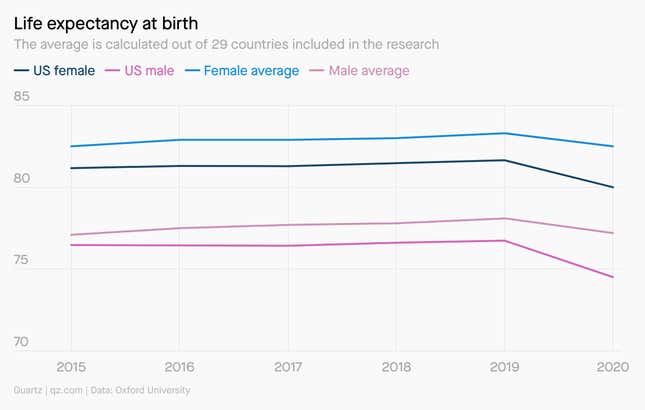
So it cargoes
Finally, a story in four charts:
1️⃣ After the pandemic reached the US in March of 2020, demand for air travel evaporated virtually overnight. It took nearly a year for passenger volumes to return to half their former heights, buoyed by the vaccines, but they have since dipped with the Delta variant.
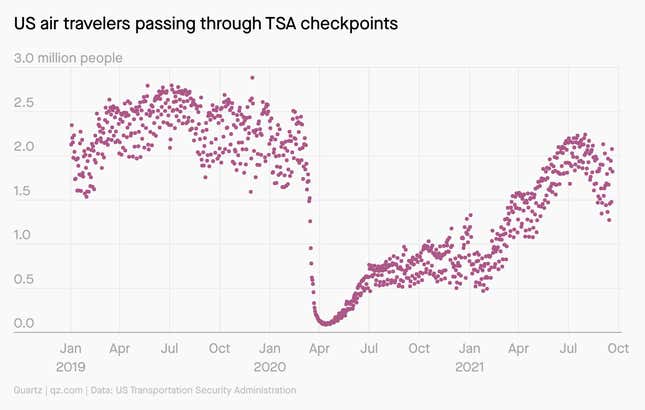
2️⃣ To plug the revenue gap, airlines leaned on cargo deliveries. They began temporarily converting wide-bodied passenger jets into cargo planes in March 2020, and found ravenous demand for their air freight services as port closures, container shortages, and one very large ship wedged in the Suez Canal created record-setting backlogs in shipping.
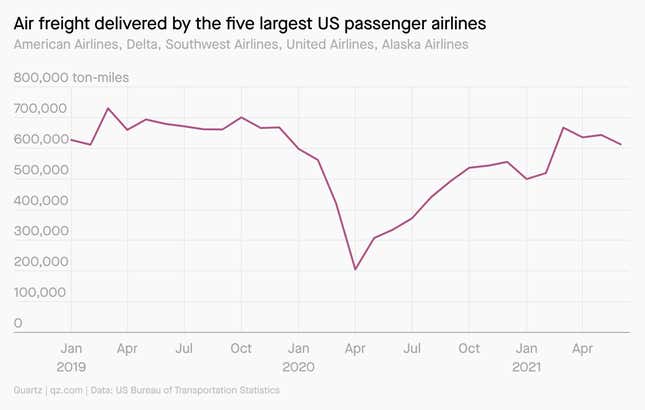
3️⃣ The biggest winner in the airline industry’s pivot to cargo was United Airlines, which operates one of the largest fleets of widebody planes on Earth and already had the biggest freight business among US passenger airlines. In the first 15 months of the pandemic, United flew more than 13,400 cargo-only flights, even as passenger totals plummeted.
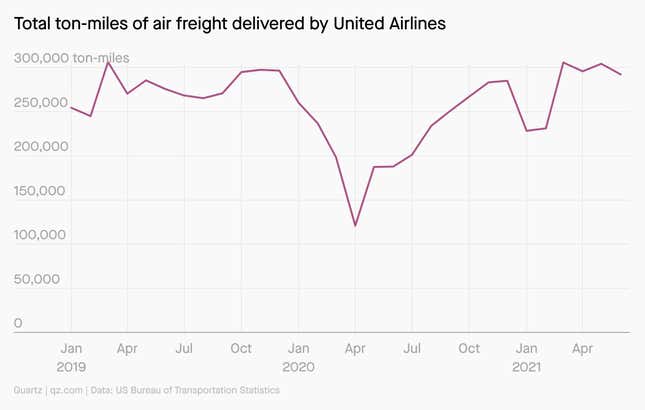
4️⃣ Even though United isn’t carrying much more cargo than it did before the pandemic, it has managed to wring much more money out of every ton it transports. The airline’s cargo revenues have doubled over pre-pandemic levels, and now total more than $2 billion per year.
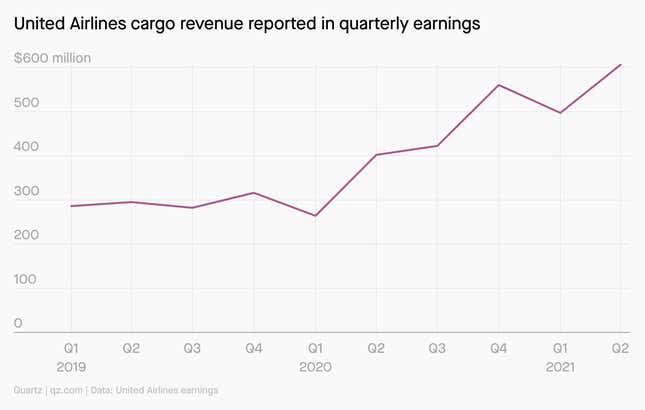
Best of all, there’s no such thing as unruly cargo.

Elsewhere on Quartz
- Never have I: Why do Chinese-language brands love “Ever”?
- Clearing space: NASA’s moon mission faces a fight over meetings
- In a world: Male CEOs with deep voices get paid more
- Change of ❤️ : Facebook is postponing Instagram kids
- Coinman: Is Joe Biden a trillion-dollar coin kind of president?
Our best wishes for a healthy day. Get in touch with us at needtoknow@qz.com, and live your best Quartz life by downloading our iOS app and becoming a member. Today’s newsletter was brought to you by Sarah Todd, JoNel Aleccia, Nicolás Rivero, Annalisa Merelli, and Kira Bindrim.
